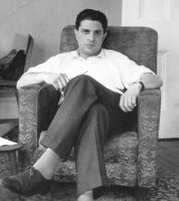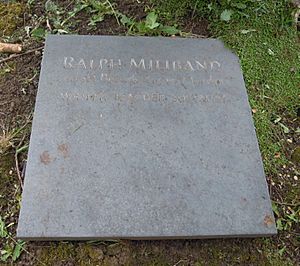Ralph Miliband facts for kids
Quick facts for kids
Ralph Miliband
|
|
|---|---|

Miliband in 1958
|
|
| Born |
Adolphe Miliband
7 January 1924 Brussels, Belgium
|
| Died | 21 May 1994 (aged 70) London, England
|
| Citizenship |
|
| Political party | Labour (1951–1964) |
| Spouse(s) |
Marion Kozak
(m. 1961) |
| Children | |
| Alma mater | London School of Economics |
|
Notable work
|
The State in Capitalist Society (1969) |
| Scientific career | |
| Institutions | |
| Thesis | Popular Thought in the French Revolution, 1789–1794 (1957) |
| Doctoral advisor | Harold Laski |
| Doctoral students | Leo Panitch |
| Other notable students |
|
| Influences | |
| Influenced |
|
| Military career | |
| Service | Royal Navy |
| Years of service | 1943–1946 |
| Rank | Chief petty officer |
Ralph Miliband (born Adolphe Miliband; 7 January 1924 – 21 May 1994) was an important British sociologist. He was known as one of the most famous academic Marxists of his time. He is often compared to other thinkers like E. P. Thompson and Eric Hobsbawm.
Miliband was born in Belgium to Polish Jewish parents who had moved there. In 1940, he and his father had to escape to Britain. They fled to avoid being harmed when Nazi Germany invaded Belgium. Ralph learned English and studied at the London School of Economics. He became very interested in left-wing politics, which focuses on equality and social justice. He promised to support the idea of socialism at the grave of Karl Marx, a famous thinker.
After fighting in the Royal Navy during World War II, he settled in London in 1946. He became a British citizen in 1948. By the 1960s, he was a key member of the New Left movement in Britain. This group questioned how socialist governments in places like the Soviet Union were run. He wrote several books about Marxist theory and how it looked at capitalism. Some of his famous books include Parliamentary Socialism (1961) and The State in Capitalist Society (1969).
Both of his sons, David Miliband and Ed Miliband, later became important members of the Labour Party in Britain. David was the British Foreign Secretary from 2007 to 2010. Ed became the Energy and Climate Change Secretary. He was later chosen as the leader of the Labour Party from 2010 to 2015.
Contents
Ralph Miliband's Life and Work
Early Years: 1924–1940
Ralph Miliband's parents grew up in a poor Jewish area in Warsaw, Poland. His father, Samuel Miliband, was part of a socialist Jewish group there. After World War I, in 1922, his parents moved to Brussels, Belgium. They met and married in 1923.
Samuel (1895–1966) was a skilled craftsman who made leather goods. His mother, Renia (1901–1975), sold women's hats to earn extra money. This was important because of the economic problems during the Great Depression in the 1930s. Renia spoke Polish, and Samuel taught himself French by reading newspapers. Ralph, whose birth name was Adolphe, was born in Brussels on 7 January 1924.
He grew up in a working-class area called Saint-Gilles. When he was 15, in 1939, he joined a socialist-Zionist youth group. In May 1940, Nazi Germany invaded Belgium during World War II. The Miliband family, being Jewish, decided to flee to escape the Nazis, who treated Jewish people very badly.
They missed a train to Paris. Adolphe, who was 16, wanted to walk to the border. But his younger sister, Anna Hélène, was only 12 and too young for such a long walk. So, Renia and Anna Hélène stayed in Brussels. Sam and Ralph went to Ostend and caught the last boat to Britain. They arrived on 19 May 1940.
Life in Britain: 1940–1959
In London, Adolphe changed his name to Ralph. He did this because "Adolphe" was too similar to Adolf Hitler, the Nazi leader. Ralph and his father found work moving furniture from houses damaged by bombs during the Blitz. After six weeks, they sent news to Renia and Anne-Marie that they were safe in London.
They later learned that Jewish people in Belgium were being sent to death camps by the Nazis. Renia and Anne-Marie managed to escape and were hidden by a French family until the war ended. They were then reunited with Sam and Ralph. Sadly, many of Miliband's relatives and his best friend were killed in the Holocaust.
Ralph also experienced unfair treatment against Jewish people in London. With help from the League of Nations, he got a place at Acton Technical College in 1941. After that, the Belgian government in exile helped him study at the London School of Economics (LSE). He became very interested in Marxism, a way of thinking about society and economics. He visited the grave of Karl Marx in Highgate Cemetery and promised to work for "the workers' cause."
During the war, the LSE moved to Cambridge because of the constant bombing of London. Ralph studied under Harold Laski, a historian and socialist thinker, who greatly influenced him. Ralph wanted to help the Belgian Resistance movement. He joined the Royal Navy in June 1943. He served for three years in the Belgian Section of the Royal Navy. He became a chief petty officer. He worked as a German-speaking radio intelligence officer in the Mediterranean. He listened to German radio messages. In June 1944, he helped support the Normandy landings, a huge operation.
After the war, Miliband returned to the LSE in 1946 and finished his degree in 1947. He started a doctorate in 1947 but finished it in 1956. He also taught at Roosevelt College in Chicago. He became a British citizen on 28 September 1948. In 1949, he became a lecturer in political science at the LSE.
The New Left Movement: 1960–1994
Miliband joined the Labour Party in 1951. In 1958, he became part of the British New Left movement. This group included thinkers like E. P. Thompson. They started a magazine called New Left Review in 1960.
In 1961, Miliband published his first book, Parliamentary Socialism. This book looked at the Labour Party's role in British politics from a Marxist viewpoint. He felt the party was not radical enough. He left the Labour Party in the mid-1960s. He believed that socialists in Britain needed to create a truly revolutionary socialist alternative.
He also started the Socialist Register magazine in 1964. He was influenced by the American sociologist C. Wright Mills, who was his friend. In 1969, he published The State in Capitalist Society. This book argued that power in Western democracies was held by a ruling class, not spread out among many groups.
Miliband strongly disagreed with American involvement in the Vietnam War. In 1967, he wrote that the U.S. was causing "wholesale slaughter" in Vietnam. He also criticized Harold Wilson, the British Prime Minister, for supporting the U.S. actions. He called it a "shameful chapter" in the history of the Labour Party.
He left the LSE in 1972 because of problems and student protests there. He became a Professor of Politics at the University of Leeds. This was a difficult time for Miliband. He had a heart attack soon after moving and did not enjoy being a head of department. He resigned in 1978. He then took up teaching positions in Canada and the USA. He taught at Brandeis University in 1977 and other universities in North America. He still lived in London. He published Marxism and Politics in 1977 and Capitalist Democracy in Britain in 1982.
In his later life, Miliband had heart problems. He had a bypass operation in 1991. He passed away on 21 May 1994, at the age of 70. He was survived by his wife and sons. He is buried in Highgate Cemetery, near Karl Marx. His last book, Socialism for a Sceptical Age, was published after he died in 1994.
Family Life
Ralph Miliband married Marion Kozak in September 1961. She was born in Poland and had a Polish Jewish background. She was also one of his former students at the LSE. They lived in London and had two sons: David, born in 1965, and Edward (Ed), born in 1969.
David and Ed Miliband
Both of his sons became politicians for the Labour Party. In 2007, they made history as the first brothers to serve together as cabinet ministers since 1938. His older son, David Miliband, was a Member of Parliament (MP) from 2001 to 2013. He served as Foreign Secretary from 2007 to 2010.
His younger son, Ed Miliband, became an MP in 2005. From 2007 to 2008, he was a Minister. In October 2008, Ed became the Secretary of the new Department of Energy and Climate Change. On 25 September 2010, he became the leader of the Labour Party. David had also run for this position. David left politics in 2013. Ed later served as a Shadow Secretary of State under Keir Starmer's leadership.
A journalist named Andy McSmith said that Ralph Miliband's life had a "nobility and a drama" that his sons' political careers lacked. In 2013, a newspaper called the Daily Mail published an article that questioned Ralph Miliband's loyalty to Britain. Ed Miliband wrote a response describing his father's life. He said the article was an unfair attack on his father. The newspaper published Ed's response but still stood by its original article. Ed Miliband received support from many politicians for his response.
The Lipman-Miliband Trust
In 1974, Ralph Miliband's friend, Michael Lipman, started the Lipman Trust. This trust helps fund education about socialist ideas. Miliband was the first chairman of the Trust until he died. He invited his wife Marion and other experts in socialist education to join the Trust. After Miliband's death, the Trust was renamed the Lipman-Miliband Trust. This was to honor his many years of work. The Trust continues to provide grants for educational projects today.
See also
 In Spanish: Ralph Miliband para niños
In Spanish: Ralph Miliband para niños
- Instrumental Marxism
- Miliband–Poulantzas debate
 | John T. Biggers |
 | Thomas Blackshear |
 | Mark Bradford |
 | Beverly Buchanan |


